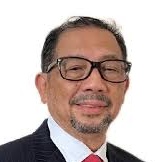
Abdul Kadir Abdullah Damsal
KOTA KINABALU (July 12): A former senior figure in Sabah’s oil and gas industry has pushed back against recent remarks by Finance Minister Datuk Seri Masidi Manjun, calling him “misleading” and lacking historical context in relation to the state’s petroleum development.
In a press statement, former Chief Executive Officer of Sabah Oil and Gas Development Corporation Sdn Bhd (SOGDC) Abdul Kadir Abdullah Damsal and a practising lawyer questioned Masidi’s claim that Sabah’s oil and gas sector only began to evolve following the establishment of SMJ Energy (SMJE) in 2021.
Abdul Kadir asserted that long before SMJE came into the picture, several state-linked companies had already been actively involved in the industry. These included Sabah Energy Corporation (SEC), Sabah International Petroleum (SIP), subsidiaries under Yayasan Sabah and SOGDC itself.
He credited much of the earlier momentum to the then-Barisan Nasional (BN) administration, noting that Petronas had, under a period of political stability, launched the Sabah Integrated Oil and Gas Project (SIOGP) in 2014, an initiative involving investments totalling nearly RM54 billion.
“These projects laid the foundation for Sabah’s current oil and gas infrastructure, created thousands of jobs and supported local engineering and service firms,” he said.
He also pointed to the formation of a Joint Working Committee (JWC) between the State Government and Petronas, which he said facilitated increased gas allocations to Sabah and significantly boosted local capacity development, including the appointment of a Sabahan as CEO of Petronas’ Sabah Ammonia Urea (SAMUR) plant.
“Contrary to recent claims, the industry was not dormant prior to the formation of SMJE. Sabahans have long played a critical role in the oil and gas sector, without resorting to political pressure on local entities such as SAMUR,” he said.
Abdul Kadir also cast doubt on the claim that Sabah-based oil and gas firms secured RM2 billion worth of Petronas contracts in 2024, suggesting the figure could be misleading without proper breakdown.
“The contracts may not necessarily have been awarded within Sabah alone and the public deserves clarity on how much actually went to genuinely Sabahan-owned firms,” he added.
Touching on SMJE’s reported RM362 million profit in 2024, Abdul Kadir clarified that the figure represented group earnings, not solely derived from its upstream interest in the Samarang field.
“A significant portion of that profit came from SIP’s 10 per cent equity in LNG Train 9 in Bintulu, a deal initiated during the BN administration and finalised under Warisan,” he explained.
He went on to highlight that other state-owned entities including Suria Capital, Sawit Kinabalu and Qhazanah Sabah, have long operated as billion-ringgit asset-based companies, stressing that SMJE’s growth should not be portrayed as an isolated success story.
Abdul Kadir concluded by urging the State Government to present a more accurate narrative to the public.
“Sabahans deserve the truth, not exaggerated claims or selectively curated retellings of the state’s economic journey,” he concluded.













